Drop Bag that is.
Yes the drop bags for the 2012 Iditarod are done, and tomorrow (2/13) I will turn them in to be shipped out to the various checkpoints along the trail. These bags contain all the gear I will have for the race, so it is critical that I get them done right. Earlier I wrote about the meat that goes into the dog diet & the thousands of booties I will use during the race. In addition to these things I also need to pack and prepare all of my personal gear and food for the race. Last year we did a photo blog on everything that goes into these immensely important drop bags, you can read more here.
Having things to look forward to on the trail can really help lift your spirits. Personally one of the little luxuries I enjoy on the trail is fresh clean socks. I have sent those to checkpoints along the trail again this year. I am also a bit of a chocolate fanatic, with a slight caffeine addiction, so that was taken into account as I packed my human food. Along with some wonderful homemade candy (Thanks Mike!), gourmet chocolate from around the world (Thanks Kirstie!) and deluxe fudge (Thanks Jiva!) I have the makings of my ‘mushers mocha’ sent out along the trail. The ‘mushers mocha’ is a mix of instant coffee and hot coco, made in my thermos and enjoyed on the trail. Of course my human food also include nutritious energy packed choices, like: nuts, dried meat, smoked salmon, dried fruits, protein shakes, power bars, delicious breads from Fairbanks local coffee chop LuLu’s Bagels, and of course the chocolate dipped bacon my amazing husband Dan made me just for the race.
Here are some photos from this years Drop Bag extravaganza with some of my thoughts about the whole process of preparing for 1000 miles :
Each of these gallon bags is full of snack foods. There is no way to know now what will sound appetizing a month from now and 100’s of miles down the trail. So I over-pack, and assume that something will appeal to me out of all the choices I pack. If you look close among the goodies, you can see the packets of Emergen-C that I hope will help keep me healthy. You can also see that my food bags are decorated with some wonderful messages and quotes to help lift my spirits when I am out on the trail.
Preparing drop bags is a coffee fueled activity at Dew Claw. You can see my full coffee mug always near by while I am working. Here I am sealing all the bags and preparing to take them all outside where I have the drop bags in order by checkpoint lined up in the driveway. As I finish preparing each item: human food, booties, dog snacks, I lay them out by checkpoint. This way I can look over all my gear for the entire race before packing the bags.
Drinks are sent out to all the checkpoints. They can be defrosted in the pots of hot water I will be making at each checkpoint for dog food. (don’t forget how cold it will be during the race, those drinks will be frozen solid!) All mushers must carry a dog cooker to melt snow or heat water. The water is added to kibble or meat to make meals for the dogs. And while the water is heating, drinks or vacuum sealed food can be tossed into the pot to defrost. That is the main way I heat my meals while camping with the team on the trail. I keep the pot of my cooker clean enough that I can drink the water out of it. And when I am camping I will use some of that hot water to replenish the mushers mocha in my thermos. At checkpoints they often have water for the dogs, and sometimes even a microwave for the mushers. So at checkpoints I will heat up a drink, then when I am ready to leave I put it in my cooler with a warm snack for the dogs. The cooler in this case is insulation to keep things warm.
Most of what we send out is perishable, and if we did not use it, remains at the checkpoint. Human food is left behind to be eaten by volunteers, press, other mushers or villagers. Dog food is also left at the checkpoint, and checkpoint personnel see that it is given out in the rural communities. But there are still lots of things that mushers want returned. This is done with return bags. You know all those socks I mentioned I was sending out. Well once I replace the well worn ones with new ones from my drop bags at the checkpoint, they go into my return bag. Along with sled plastic if I didn’t use it. The booties taken off after the run to a checkpoint get stuffed into a ziplock bag and go in the return bag. Basically any non perishable item that I would like to get back after the race. All these things can be put into my return bag, which I leave at a designated location at the checkpoint. Return bags are flown back to Anchorage and can be picked up at the Iditarod headquarters after the race, or are mailed to mushers who can not pick them up. You can see that they need to be labeled with my name and address. I also attach an arctic zip-tie to each one. Making it easy for me to seal them up once I have packed them with the gear I want back.
The Iditarod provides mushers with the bags we pack for each checkpoint. They are pre-labeled with the checkpoint name, and color coded by location. Red for the Alaska Range, Purple for the Yukon, Blue for Rohn to Cripple, Orange for the Unalakleet area. For each checkpoint one of the bags has the word “FREEZE” in bright red. This bag is for frozen meats and perishables. Although every effort is made to keep all the drops cold, a special effort is made for the “FREEZE” bags.
You can see the baggies of meat snacks we use on the trail lined up beside me. These will all be packed in the “FREEZE” bags. And to help we also add some large blocks of meat to the bottom of each “FREEZE” bag. The larger blocks of meat act like ice in a cooler. But they also are an important part of my emergency plan. If weather becomes sever and I need to stay at a checkpoint longer I can use the meat to make meals, or cut it up with my ax for additional snacks. Mushers over-pack in order to try and make sure that they are prepared for any situation.
After everything is organized by checkpoint, and checked, and double checked bags can be packed. The bags are packed so that what I will need first at each checkpoint is easily accessible on top. If I have planned on going through a checkpoint I have everything I want to pick up and take with in one bag. And then additional food and gear in a second bag, just in case plans change.
Once weighed and sealed all the bags go back into the walk in freezer. I want to make sure everything is as frozen solid as possible. We worked way too hard and too long, want to make sure everything stays frozen solid, and the temperatures in Fairbanks this month have been unseasonably warm.
Bags will be turned in tomorrow, and then a weight will be lifted. They will be out of my hands and headed out on the trail ahead of me. If I have done my job I will be all set for the adventure ahead.
Now is the perfect time, as I reflect on all the hard work and effort, to thank the wonderful people who helped. Dan and Joel: thank you for putting up with me, I know I can be demanding and anal retentive about my drop bags, but I also know I could not do it without you!
And to the wonderful members of
Team Dew Claw, who generous support has helped make it possible for me to have quality food and gear for this years race ~ THANK YOU!!

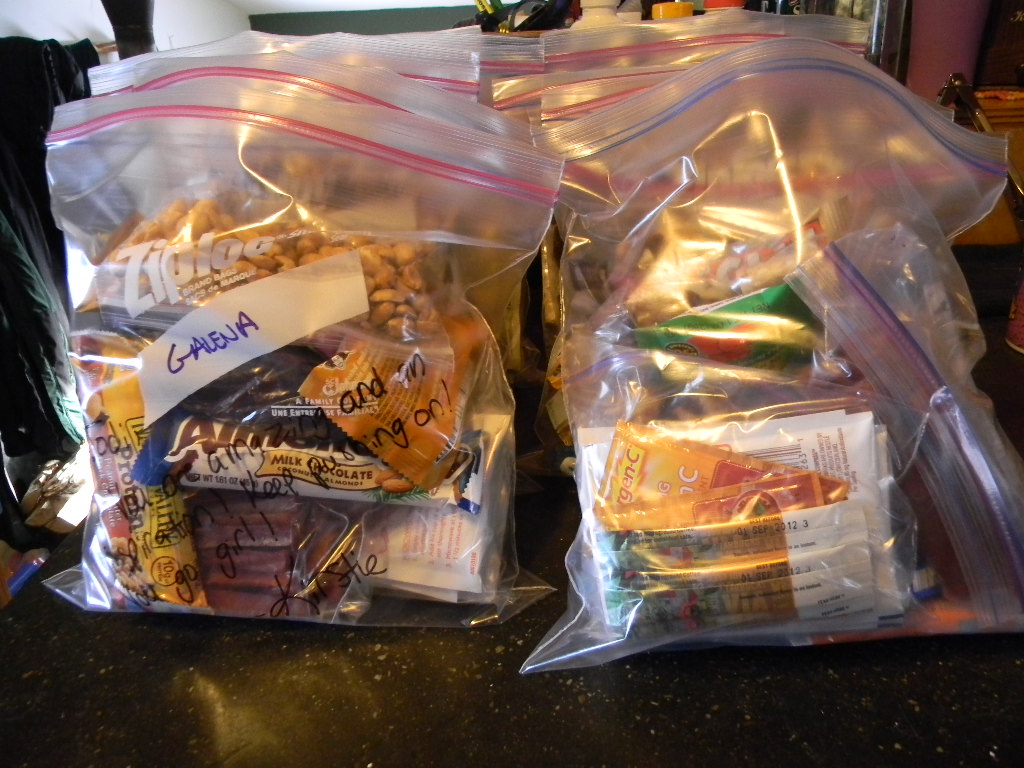
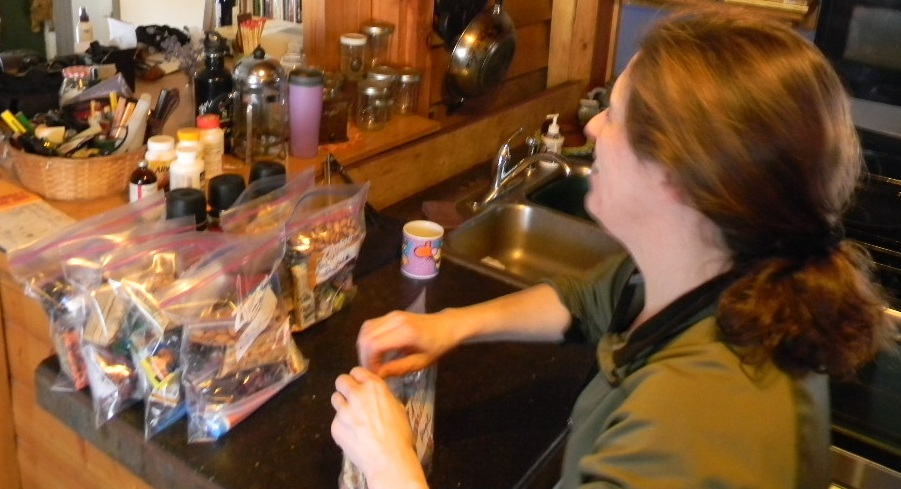
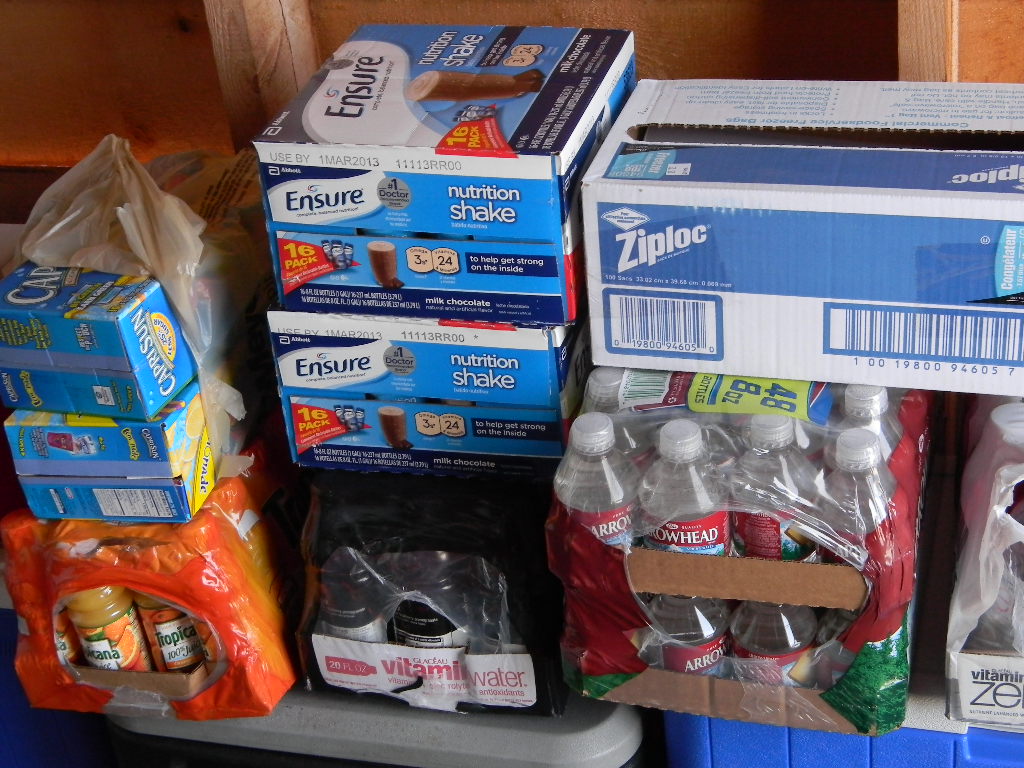
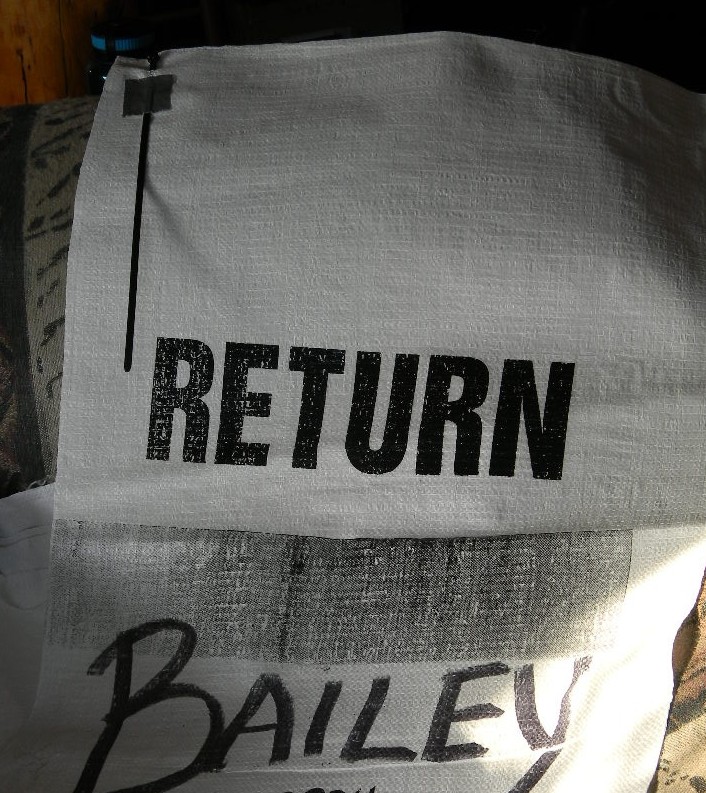
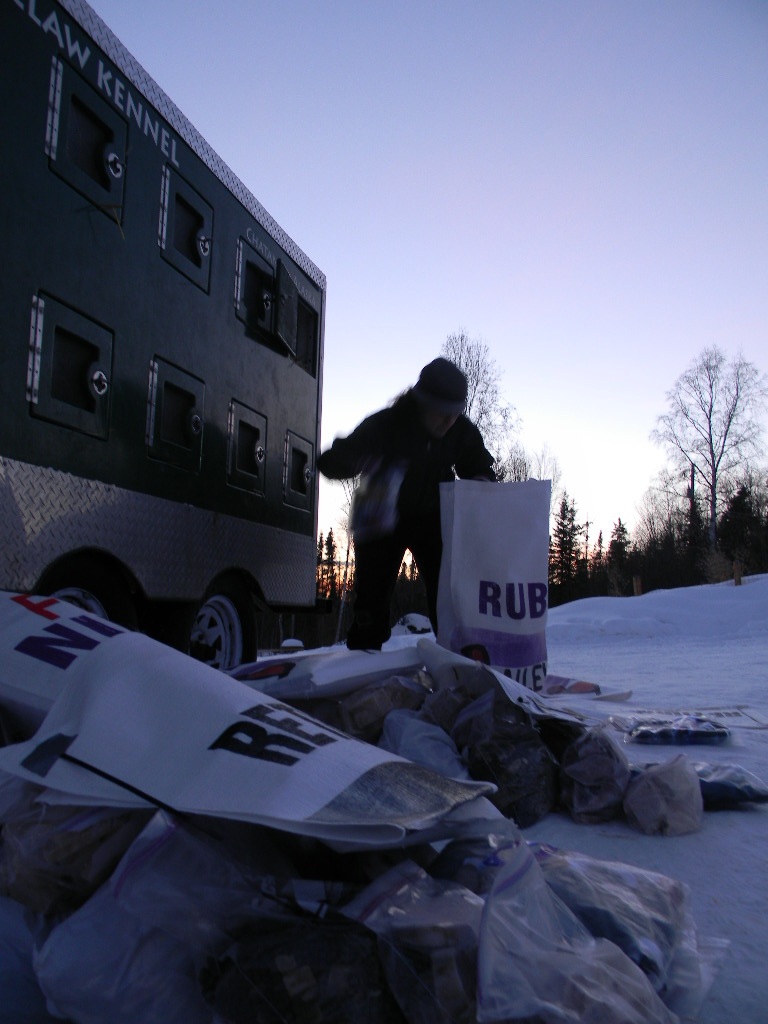
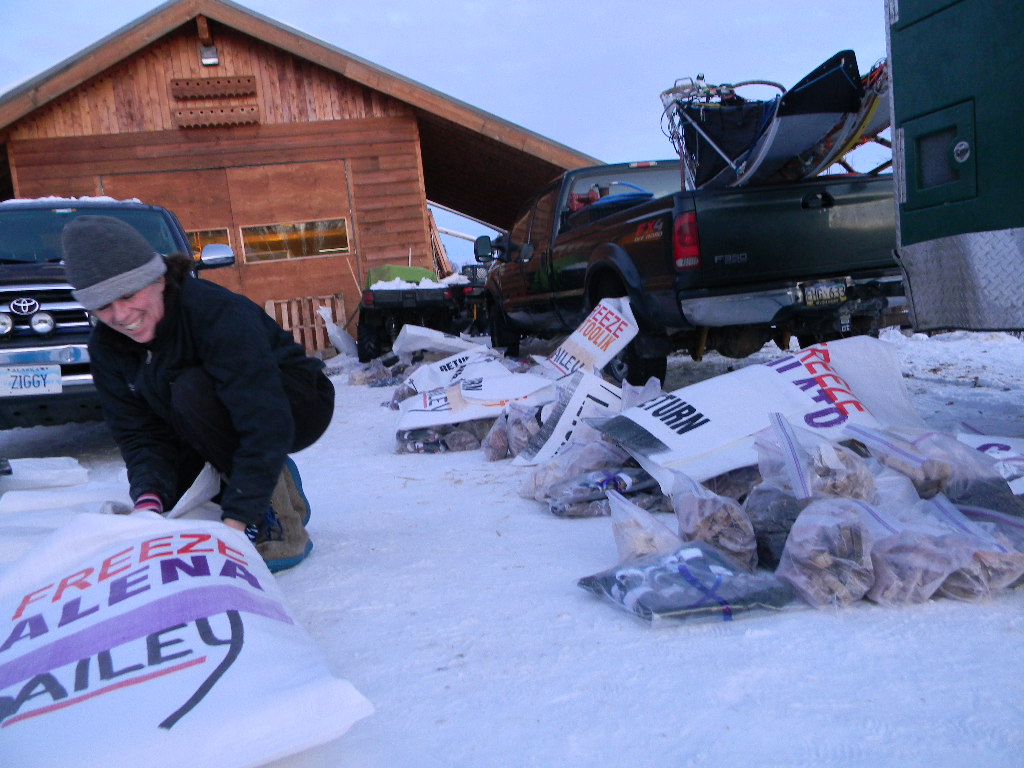
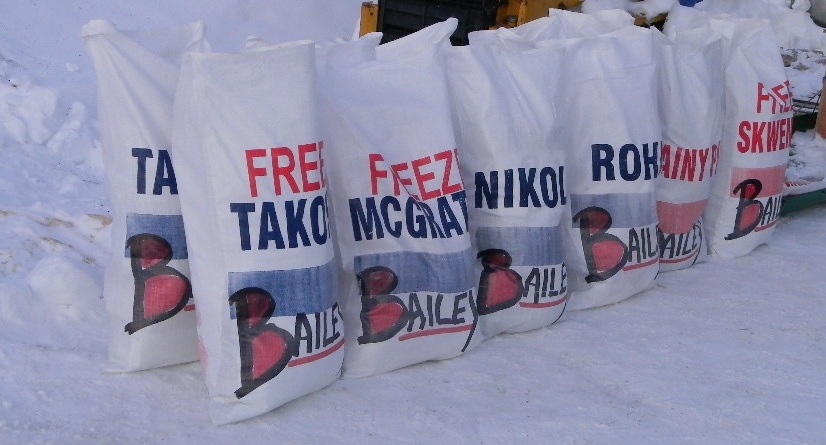
Thanks for taking the time out to write and share your preparations with us Jodi. It’s great reading. Good luck!
Georganne
Pingback: Iditarod 2012 ~ the way I remember it (Part I) | Dew Claw Kennel: Yukon Quest and Iditarod Mushers
Pingback: Iditarod 2012 the trail – Part II | Dew Claw Kennel: Yukon Quest and Iditarod Mushers
Pingback: How much fun can you pack into a weekend? Part II – The Run of the Mine | Dew Claw Kennel: Yukon Quest and Iditarod Mushers
Pingback: Stress is good for you, right? | Dew Claw Blog: a life lived with dogs